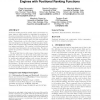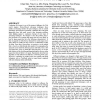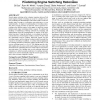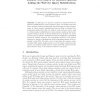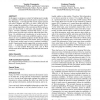168
Voted
SIGIR
2012
ACM
13 years 4 months ago
2012
ACM
Positional ranking functions, widely used in web search engines, improve result quality by exploiting the positions of the query terms within documents. However, it is well known ...
160
click to vote
SIGIR
2012
ACM
13 years 4 months ago
2012
ACM
Combating Web spam is one of the greatest challenges for Web search engines. State-of-the-art anti-spam techniques focus mainly on detecting varieties of spam strategies, such as ...
151
Voted
WSDM
2012
ACM
13 years 9 months ago
2012
ACM
We present a new approach for personalizing Web search results to a specific user. Ranking functions for Web search engines are typically trained by machine learning algorithms u...
110
click to vote
CIKM
2011
Springer
14 years 2 months ago
2011
Springer
Traditionally, search engines have ignored the reading difficulty of documents and the reading proficiency of users in computing a document ranking. This is one reason why Web se...
129
click to vote
SIGIR
2011
ACM
14 years 5 months ago
2011
ACM
Search engine switching is the voluntary transition between Web search engines. Engine switching can occur for a number of reasons, including user dissatisfaction with search resu...
159
click to vote
KCAP
2011
ACM
14 years 5 months ago
2011
ACM
Enriching knowledge bases with multimedia information makes it possible to complement textual descriptions with visual and audio information. Such complementary information can he...
146
Voted
ECIR
2011
Springer
14 years 5 months ago
2011
Springer
In large web search engines the performance of Information Retrieval systems is a key issue. Block-based compression methods are often used to improve the search performance, but c...
141
Voted
DASFAA
2011
IEEE
14 years 5 months ago
2011
IEEE
In this paper, we propose a method to search the Web for sentence substitutions for a given sentence query. Our method uses only lexico-syntactic patterns dynamically generated fro...
140
Voted
CHI
2011
ACM
14 years 5 months ago
2011
ACM
Understanding how people interact with search engines is important in improving search quality. Web search engines typically analyze queries and clicked results, but these actions...
141
Voted
CHI
2011
ACM
14 years 5 months ago
2011
ACM
In this paper, we propose a system for helping users to judge the credibility of Web search results and to search for credible Web pages. Conventional Web search engines present o...
